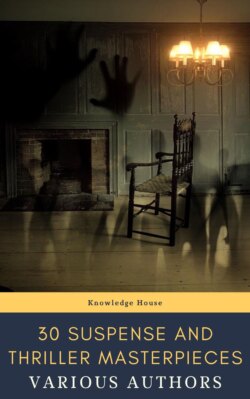Читать книгу 30 Suspense and Thriller Masterpieces - Гилберт Кит Честертон, Eleanor Bron, Томас Харди (Гарди) - Страница 32
На сайте Литреса книга снята с продажи.
Chapter 29 COMPROMISING DISCOVERIES
ОглавлениеFandor, smoking a good cigar, walked to the Rue Monceau, taking deep breaths of the fresh air, looking up with delight at the blue sky. After his imprisonment and slow torture he experienced an extraordinary joy in living and in his freedom.
When he reached the house he found the concièrge's office empty. He called out several times.
"I'm the concièrge, what is it you want?" a voice answered behind him.
Fandor turned sharply:
"Ah, there you are, Madame, I didn't see you."
It would have surprised the journalist had he known that the extraordinary Mme. Citron a moment before had been comfortably installed in the Marquis de Sérac's apartment, and that hearing herself called, she had slid down her communicating post to answer the summons. Still further was he from imagining that the Marquis de Sérac and Mme. Citron were one and the same person.
"Well, now that I'm here, what is it you want?"
Madame Citron recognized Fandor. But she recognized him as being some one he was not. She had, indeed, only seen him for a few moments immediately after the murder of Susy d'Orsel.
"I want to see Mlle. Marie Pascal. She lives here, doesn't she?"
"Yes, Monsieur, but … "
"Is she at home?"
"What is it about?"
Fandor answered casually:
"I have an order to give her."
"Then, if Monsieur will leave it with me… "
"Why? Isn't Mlle. Marie Pascal here?"
"No, Monsieur."
"Will she be long away?"
"I'm afraid she will."
"All right, I'll come back about six o'clock. I must see her personally, I have a number of details to explain."
Mme. Ceiron shook her head.
"I don't think you'll find her."
"Why not?"
"Well, she's in the country."
"Will she be away for several days?"
"I expect so."
Fandor decided to burn his bridges.
"Look here, it's not about an order; I'm sent here by Juve, you know him?"
"The detective?"
"Yes, Madame, the detective."
Madame Ceiron appeared to be very disturbed.
"Oh! I shall get jaundice from all this bother. I can't even sleep in peace. It'll end in them suspecting me, I know it will."
"No, no, Madame, I assure you… ."
"After all, I'd rather tell you the exact truth, then you can't complain of me. You see, it's this way: Yesterday the little girl came and said to me, 'Madame Ceiron, I'm so upset and unhappy, and I'm bothered to death with questions, too, and then, this King who isn't a King … I've a good mind to pack my trunk and go away.' So I said to her, if that's the case, go by all means—she had paid a quarter's advance—and when you are ready just come back—and that's all there is to it, Monsieur."
"You have no idea where she went, Mme. Ceiron?"
"Well, I heard her tell the cab-driver to take her to the Montparnasse Station."
"Do you know if she has any friends or relations in the country?"
"Ah!—that's a good idea, Monsieur, now I come to think of it, she always went on her holidays from the same station, probably to visit some of her family, but where they live I haven't the least idea."
Fandor had an inspiration.
"Maybe she has received letters which will tell us! Have you the key of her room?"
"Yes, I have the key; would you like to go up?"
"Of course!—I must make a search through her belongings."
Jerome Fandor felt strangely agitated in entering the simple room of the young lace-maker. It has been frequently said that the souls of people can be divined from the atmosphere of their homes, and if this is true, the journalist was surely not mistaken when at the Royal Palace he had experienced a rather warm feeling for Marie Pascal.
The room showed no sign of precipitate abandonment, nor any preparation for a long absence. Her work-basket and cushions were all in place, and one would have expected her return at any moment. But alas! Fandor could harbor no illusion regarding her. Her flight was evidently to escape a probable arrest by Juve. A minute inspection of Marie's papers disclosed nothing of importance; but upon opening the last drawer in her desk he found, hidden under envelopes and letter paper, a number of small objects.
"Ah! the devil!" he exclaimed.
The objects were jewels, brooches, rings, earrings and also a large key, evidently of an apartment door. One glance at the jewels was enough. Fandor had seen and admired them upon the person of Susy d'Orsel during the supper which preceded her tragic death.
"My God! there's no doubt now," he muttered, "Marie Pascal is the accomplice of Fantômas."
And then the journalist decided upon a theory to account for her having left the jewels behind. She had probably arranged to have them found among somebody else's things and thus to throw suspicion from herself, just as she had attempted to leave the famous chemise in the Marquis de Sérac's laundry.
"What will Juve say to this? I must see him right away!"
He turned to the concièrge:
"Madame Ceiron, I realize our search here will be without result, so I will leave you now and probably return about ten to-night with my friend Juve."
"Very good, Monsieur. You found nothing, I suppose?"
"Nothing at all," declared Fandor.
While Fandor was going downstairs the pseudo Mme. Ceiron made a grimace.
"He's found nothing, hasn't he? And yet he's turned over everything I left in that drawer! He's not so clever as Juve, although he isn't a fool… . After all, I don't care, I've got them both where I want them."
Jerome Fandor shouted an address to his driver:
"Rue Bonaparte, and if you hurry there's a good tip waiting for you."
